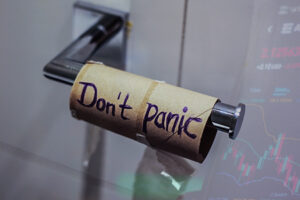Confidence in trading - how to develop it?
Confidence and Forex Trading
"Profitable trading should be easy and not generate much stress" - we can often come across such a theory. However, theory and practice are two different worlds and I know that many traders often find themselves in a state where they are emotionally trying to force a profitable trade. Of course, this leads to mental exhaustion or frustration, because this is not how trading should be. A trader who lacks confidence does not know how to approach the markets, and no matter how hard he tries, his results will not be satisfactory for him in the long term.
Beginners focus on making their transactions always profitable and believe that the more they conclude, the better their chances are. This is a wrong and exhaustive approach because they try to control the only thing that the investor cannot control, namely: price. When you open a transaction, you should focus on what we have influence: on entries, placement of orders, sticking to the rules and controlling yourself. Everything else is just noise and irrelevant things. The investor's task is not to outsmart the markets.
In this article, we'll focus on aspects that are worth controlling to develop greater confidence. Greater confidence in yourself will positively translate into our trading results.
Be sure to read: 7 the most popular trading myths
Trading time
Let's start with the trader's greatest advantage. We decide when to enter the market and when to just stay away from it. If you do not like what you see in the chart, just do nothing and refrain from transactions. You should only enter a position if you are convinced that you have an advantage. Beginners make the mistake of believing that they must be on the market all the time. In fact, you only need a few good transactions a month to be ahead. The more you understand that YOU DO NOT NEED trade, the better your score will be.
"Better an hour to think about your money than a week to work for it." - Andre Kostolany
Exit from the transaction
Here comes the second significant advantage. Once you are in a transaction, you are not stuck in it forever and you are not a victim of what the market wants to do with you. You can close the position at any time. If you see that the price is moving towards your stop loss order, do not sit there but take action and close the transaction manually to minimize losses. In turn, when you make a profit but you see signs that the price is turning, don't give away all your profits, just cash them. You have all influence over your positions. Although you can't control the outcome of a transaction, you have a lot of influence on how much you gain and how much you lose, and when you want the transaction to end.
Tools that match your style
Each investor is different and that's why you need to find tools that suit you. Some they prefer to use indicators to make decisions, others prefer to trade based on pure price, and others use a combination of both methods. The possibilities are really big: oscillators, moving averages, abolition of Fibonacci. You should not forget about support and resistance levels or zones supply / demand. It is also important to choose the right time interval. Some traders believe that lower intervals are too susceptible to noise, others are advocates of these fast moving charts. Always choose the investment horizon in which you feel best and make trading decisions at your own discretion. There is no reason for you to trade based on a method that does not fully match your personality.
Trade Interpretation
Trading on the nerves, with the intent to play hard and being overly excited about profitable trades, are just one of two reasons that traders lose far more money than necessary. Emotions and psychology play a very important role in trading. Remember, however, that they form in your head and you are the one who triggers and controls them. Loss is simply a loss. This is an unavoidable part of this game and no matter how good a trader you are, you will lose money at certain times. The more you try to fight losses, the worse the result can be. It should be remembered that even if something generates a loss at the beginning, it does not mean that the final result will not be satisfactory and a specific strategy or plan for trading will not earn.
On the other hand, there's no reason to get excited about overly profitable transactions. Accounting for profit should be something normal. It's very good to make money and that's why we all play this game, but leaving the excitement next to it is the best way out for your wallet. You have to go further, follow your plan and treat trading as a business.






















![Forex Club – Tax 9 – Settle tax on a foreign broker [Download the Application] Forex Club - Tax 9](https://forexclub.pl/wp-content/uploads/2024/02/Forex-Club-Podatek-9-184x120.jpg?v=1709046278)
![Trading View platform – solutions tailored to the needs of traders [Review] trading view review](https://forexclub.pl/wp-content/uploads/2024/03/trading-view-recenzja-184x120.jpg?v=1709558918)
![How to connect your FP Markets account to the Trading View platform [Guide] fp markets trading view](https://forexclub.pl/wp-content/uploads/2024/02/fp-markets-trading-view-184x120.jpg?v=1708677291)
![How to invest in ChatGPT and AI? Stocks and ETFs [Guide] how to invest in chatgpt and artificial intelligence](https://forexclub.pl/wp-content/uploads/2023/02/jak-inwestowac-w-chatgpt-i-sztuczna-inteligencje-184x120.jpg?v=1676364263)


![WeWork – the anatomy of the collapse of a company valued at $47 billion [WeWork, part II] wework bankruptcy story](https://forexclub.pl/wp-content/uploads/2024/04/wework-bankructwo-historia-184x120.jpg?v=1711729561)
![Adam Neumann – the man who screwed up Softbank [WeWork, part AND] adam neumann wework](https://forexclub.pl/wp-content/uploads/2024/04/adam-neumann-wework-184x120.jpg?v=1711728724)





![How to transfer shares to another brokerage office [Procedure description] how to transfer shares to another brokerage house](https://forexclub.pl/wp-content/uploads/2024/03/jak-przeniesc-akcje-do-innego-biura-maklerskiego-184x120.jpg?v=1709556924)

![The most common mistakes of a beginner trader - Mr Yogi [VIDEO] Scalping - The most common mistakes of a beginner trader - VIDEO](https://forexclub.pl/wp-content/uploads/2024/03/Scalping-Najczestsze-bledy-poczatkujacego-tradera-VIDEO-184x120.jpg?v=1711601376)
![Learning patience: No position is also a position - Mr Yogi [VIDEO] Scalping - Learning patience - No position is also a position - VIDEO](https://forexclub.pl/wp-content/uploads/2024/03/Scalping-Nauka-cierpliwosci-Brak-pozycji-to-tez-pozycja-VIDEO-184x120.jpg?v=1710999249)
![When to exit a position and how to minimize losses - Mr Yogi [VIDEO] Scalping - When to exit a position and how to minimize losses - VIDEO](https://forexclub.pl/wp-content/uploads/2024/03/Scalping-Kiedy-wyjsc-z-pozycji-i-jak-minimalizowac-straty-VIDEO-184x120.jpg?v=1710336731)




![Jason Zweig "Your brain, your money" [REVIEW] jason zweig your brain your money](https://forexclub.pl/wp-content/uploads/2022/02/jason-zweig-twoj-mozg-twoje-pieniadze-300x200.jpg?v=1644579798)
![Choose and win a book by Andre Kostolany - "Psychology of the Stock Exchange" [Competition] Stock market psychology contest](https://forexclub.pl/wp-content/uploads/2021/12/psychologia-gieldy-konkurs-300x200.jpg?v=1639400692)











